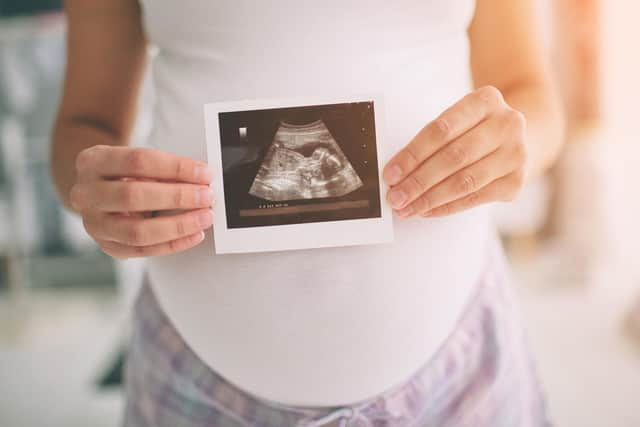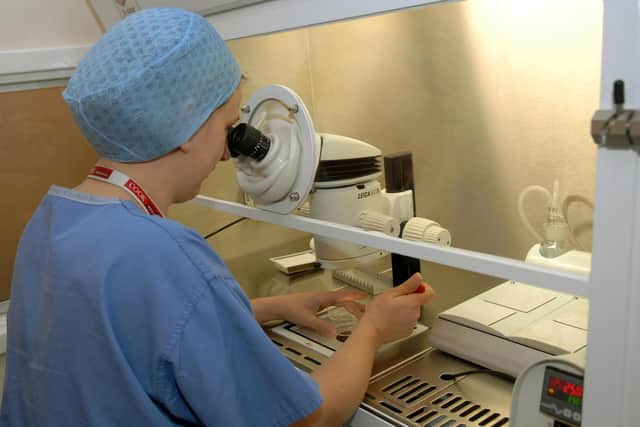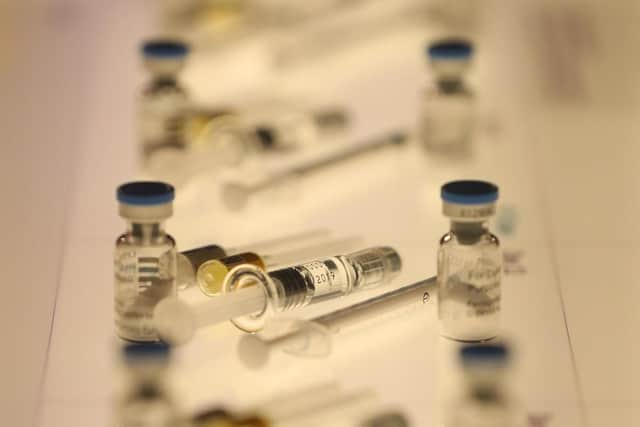Leeds couple open up about their fertility struggles and how they achieved their dream of becoming parents
and live on Freeview channel 276
Now, after years of tests and procedures, the couple are lucky enough to have family they so desperately wanted, thanks to the wonders of science.
But that has not come without cost, not just financial, but also the physical, emotional and social impact fertility problems wreak.
Advertisement
Hide AdAdvertisement
Hide AdPaul has spoken to the Yorkshire Evening Post about their heartrending quest to become parents - which involved years of treatments, multiple failures, the devastating death of their first baby, a girl, shortly after birth, the eventual need to use donor sperm to help conceive their three boys and the eye-watering £25,000 cost to achieve their dream of a family.


It comes on the back of National Fertility Awareness Week, organised by Fertility Network UK which revealed the stark differences in fertility care across the country.
In Leeds, where Paul and Hannah were treated, the city’s CCG funds just one round of IVF - far short of the three rounds recommended by health watchdog NICE.
The couple used savings, took out a bank loan and received generous donations from friends to help pay for their treatment - but Paul says many will not be as lucky.


Advertisement
Hide AdAdvertisement
Hide AdPaul, 36, said: “Without the whole IVF journey, I don’t know where I would be right now to be honest. Science has saved my life. I wish it was more readily available to everyone who might potentially need it.
“I hate to think of people out there like us who couldn’t have afforded it - but if they could, it may have changed their lives.”
The couple’s bid to have a family began shortly after they wed in 2008.
When they failed to fall pregnant over the next three years, a friend gently suggested they seek advice.


Advertisement
Hide AdAdvertisement
Hide AdPaul said for the next 18 months all attention focused on his wife before they eventually switched to him - and found his sperm was “really poor”.
The couple were then referred to a clinic for treatment, where they were told they would only be eligible for one round of IVF on the NHS.
Sadly this funded round - which included one abandoned round and a subsequent full round - failed to work.
Despite starting out with ten successfully fertilised eggs, by day three this had fallen to eight or nine and by day five, just “one and a bit” were still going - with doctors correctly predicting the one embryo they implanted back would fail.
Advertisement
Hide AdAdvertisement
Hide AdPaul said: “All that grief. People say ‘how can you grieve for something you didn’t have?’ But you’re grieving what you have lost and the hope that came with that.”
The clinic had a plan of action for further treatments - but this would all now come at a price.
“We had it in our head that this third attempt would be our last,” said Paul.
Thankfully, this attempt worked, leaving them “overwhelmed with joy and happiness, and hopes and dreams,” said Paul.
Advertisement
Hide AdAdvertisement
Hide AdHannah had a successful pregnancy until her waters broke at 27 weeks and she went on to develop sepsis.
Their baby girl also contracted the infection and tragically passed away in her father's arms shortly after being born.
Paul said: “She was beautiful, with brown eyes. She was just amazing.”
“She’s everywhere we go. And without her, we wouldn’t have had the boys. We knew it was feasible for us to be pregnant and carry that pregnancy, which we never knew before.
Advertisement
Hide AdAdvertisement
Hide Ad“Alongside grieving for our daughter, we knew we were on the clock because fertility, regardless of what avenue you go down, you have a short timeframe.
“We knew we wanted to be parents again.”
The couple summoned the strength and found the money to embark on more treatment - but after two more failed IVF rounds, further tests revealed Paul’s sperm quality had deteriorated and was now unusable.
Paul said: “That came with even more emotions and trauma. It feels like everything has been snatched away from you. Gut-wrenching. Heartbreaking. Not just for me, but knowing I wouldn’t be able to provide what we both desperately wanted.”
He added: “We didn’t know what to do - didn’t have a clue.
“We laid out all our options. I knew my wife wanted to carry another baby and we knew that was possible.
Advertisement
Hide AdAdvertisement
Hide Ad“We know it wouldn’t be right for everyone but we looked into donor options. Quite thoroughly - because that’s what we do. And we decided it was going to be right for us.”
The couple paid a service to find them as close a genetic match to Paul as possible, and thankfully their first round of IVF was successful - producing twin boys, who were born in August 2017.
“It changed my life forever,” said Paul. “I know friends who couldn’t have done what we did but I can’t imagine my life without what we have done.
“They [the boys] are every bit of me apart from a cell.
“I liken it to if I needed a liver transplant, would I accept it and I absolutely would.
Advertisement
Hide AdAdvertisement
Hide Ad“I needed that cell to help me live. Someone out there somewhere had the courage to do what he did to give me that cell, without even knowing.”
The couple then used the same donor’s sperm to conceive another child and their third boy was born last year.
“I look at them and think ‘God I’m so lucky’. And I can’t believe I say that after my little girl passed away. Because we are so lucky in some ways and unfortunately not in others.”
He said his children have been told how they came to be born.
Advertisement
Hide AdAdvertisement
Hide Ad“They will always know. We’ve never hidden anything from them. They know dad needed a cell from another man - or seed we call it.”
He said it is now “absolutely a dream” to have his family, despite the incredibly difficult journey in getting there.
He said: “I know some people who wouldn’t be able to do it.
“There’s such a difference with postcode lottery for IVF.
“It’s not just postcode but also a socioeconomic lottery as well.
Advertisement
Hide AdAdvertisement
Hide Ad“And there will be so many people out there that don’t have the resilience or perseverance to do it. You can see why it can potentially split people up.
“We were in it together and knew what we wanted and never wavered in supporting each other, no matter how things went.”
Reflecting on the £25,000 cost, he said: “It’s worth it when it works but when it doesn’t, you question whether it was the right decision.
“But it’s been the best investment we have ever made.”
Gwenda Burns, chief executive of Fertility Network UK, said: “Not being able to have the family you yearn for can be an incredibly isolating experience.
Advertisement
Hide AdAdvertisement
Hide Ad“Far too often people struggle in silence with fertility issues but together - sharing stories and experiences - we can change perceptions and signpost support.”
***The current criteria for Leeds NHS fertility treatment includes:
*One full cycle of IVF.
*Up to six cycles of IUI for same-sex couples followed by further assisted conception if required.
*Neither partner should have any living children (this includes adopted not fostered) from that or any previous relationship.
*Women must be aged 18-42.
Advertisement
Hide AdAdvertisement
Hide Ad*Individuals who feel they have “exceptional circumstances” can speak to their doctor about submitting an individual funding request.
A Leeds CCG spokeswoman said the city’s fertility policy is based on the Yorkshire and Humber policy and the decision to fund one IVF cycle was made by all CCGs in West Yorkshire “based on the needs to prioritise healthcare services consistently within available resources”.
She added: “In addition to commissioning effective healthcare, CCGs are required to ensure that resources are allocated equitably to address the health needs of the population.
“Therefore the CCG needs to exercise discretion as to the number of cycles of IVF that they will fund up to the maximum recommended by NICE.”
*names have been changed.
Advertisement
Hide AdAdvertisement
Hide AdSupport the YEP and become a subscriber today. Enjoy unlimited access to local news and the latest on Leeds United, With a digital subscription, you see fewer ads, enjoy faster load times, and get access to exclusive newsletters and content. Click here to subscribe.
